Guide/Manual
Aug 16 2023
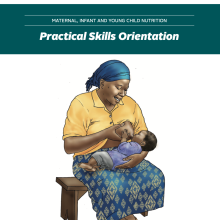
Alive & Thrive Nigeria MIYCN Practical Skills Training Manual
This manual can be used as part of an in-service orientation/training for newly employed or deployed health professionals working in MIYCN. It can also be used to train existing primary healthcare (PHC) workers on essential MIYCN services that can be integrated into PHC services.
Report
Apr 30 2019

Maternal, Infant, and Young Child Nutrition and Nutrition-sensitive Practices in Indonesia
This report provides a clear path and guidance for the government and other key stakeholders to develop a national advocacy and behavior change communication strategy for stunting reduction.
Guide/Manual
Oct 25 2018
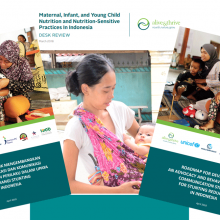
Roadmap for Developing an Advocacy and Behavior Change Communication Strategy for Stunting Reduction in Indonesia
This roadmap facilitates alignment, improves sense of ownership, ensures relevant stakeholders are involved, and sets an appropriate structure for the process of putting together the communication strategy.
Poster/Graphic
Jun 02 2017
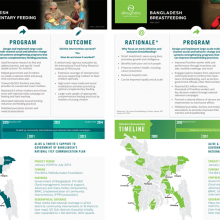
Breastfeeding and complementary feeding intervention summary and results
These two infographics summarize Alive & Thrive’s work in Bangladesh from 2009 to 2014. The rigorously evaluated intervention resulted in large scale improvements in exclusive breastfeeding and complementary feeding practices.
Poster/Graphic
May 31 2016
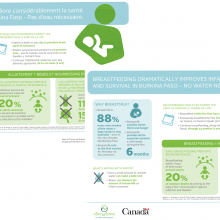
Breastfeeding dramatically improves infant health and survival in Burkina Faso - no water needed
Easy-to-use reference tool that highlights optimal breastfeeding practices in Burkina Faso, and is intended for use by decision-makers and stakeholders when advocating for optimal breastfeeding practices.
Report
Apr 30 2016
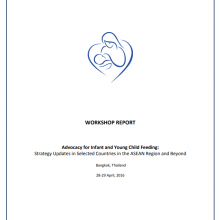
Advocacy for infant and young child feeding: Strategy updates in selected countries in the ASEAN region and beyond
Strategic and well-coordinated advocacy is essential to improve nutrition at scale. Recent efforts in countries throughout Southeast Asia have generated regional momentum and resulted in stronger nutrition policies and programs.

